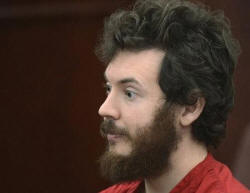|
 Jurors
begin deliberating in Colorado movie massacre trial Jurors
begin deliberating in Colorado movie massacre trial
 Send a link to a friend
Send a link to a friend
[July 16, 2015]
By Keith Coffman
DENVER (Reuters) - Jurors in Colorado's
movie massacre trial began deliberating on Wednesday on the fate of
gunman James Holmes, who has pleaded not guilty by reason of insanity to
multiple counts of murder and attempted murder stemming from his rampage
in July 2012.
|
|
 Holmes, a 27-year-old former neuroscience graduate student from
California, could face the death penalty if he is convicted of
opening fire inside a midnight premiere of a Batman movie at a
Denver area multiplex, killing 12 people and wounding 70. Holmes, a 27-year-old former neuroscience graduate student from
California, could face the death penalty if he is convicted of
opening fire inside a midnight premiere of a Batman movie at a
Denver area multiplex, killing 12 people and wounding 70.
The jury of nine women and three men heard evidence and both sides'
closing arguments in a capital trial that lasted almost three
months. They went home on Wednesday without reaching a verdict, and
will resume deliberations on Thursday.
During the trial, two court-appointed psychiatrists testified for
the prosecution that while the defendant is severely mentally ill,
he was sane when he plotted and carried out the massacre.
The defense conceded that Holmes was the gunman who opened fire and
killed the moviegoers. Their case centered on two hired
psychiatrists who concluded that he is delusional and schizophrenic,
and cannot be held legally accountable.
 If the jury agrees Holmes was insane, he would avoid execution and
likely spend the rest of his life committed to the state's mental
hospital in Pueblo, 100 miles (160 km) south of Denver.
Under Colorado's insanity defense law, the prosecution must prove he
was sane for him to be found guilty.
By late-afternoon, Arapahoe County District Court Judge Carlos
Samour had summoned lawyers for both sides into court three times in
response to written queries from the jurors.
The questions included whether they could be given an index to the
thousands of pieces of evidence to locate items more quickly. But
Samour said that would not be possible because both sides would
contest the descriptions of the evidence.
[to top of second column] |

"They'll have to do it the hard way," the judge said.
If jurors return a guilty verdict on any of the murder charges, a
penalty phase would be held during which prosecutors would present
aggravating evidence to make their case for the death penalty. The
defense team would argue mitigating factors against execution.
If Holmes is convicted of first degree murder, a decision to spare
his life in the penalty phase would result in a mandatory life
sentence without the possibility of parole.
Holmes did not testify in his own defense, but jurors watched video
of some 23 hours of interviews conducted with him by one of the
court-appointed psychiatrists.
(Reporting by Keith Coffman; Writing by Daniel Wallis; Editing by
Chizu Nomiyama and David Gregorio)
[© 2015 Thomson Reuters. All rights
reserved.]
Copyright 2015 Reuters. All rights reserved. This material may not be published,
broadcast, rewritten or redistributed.
 |